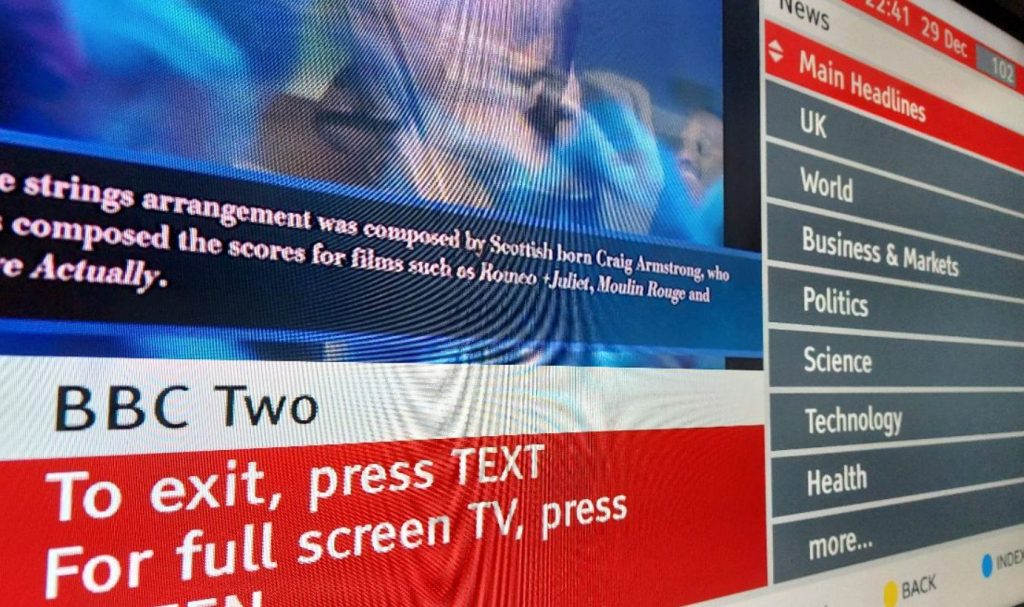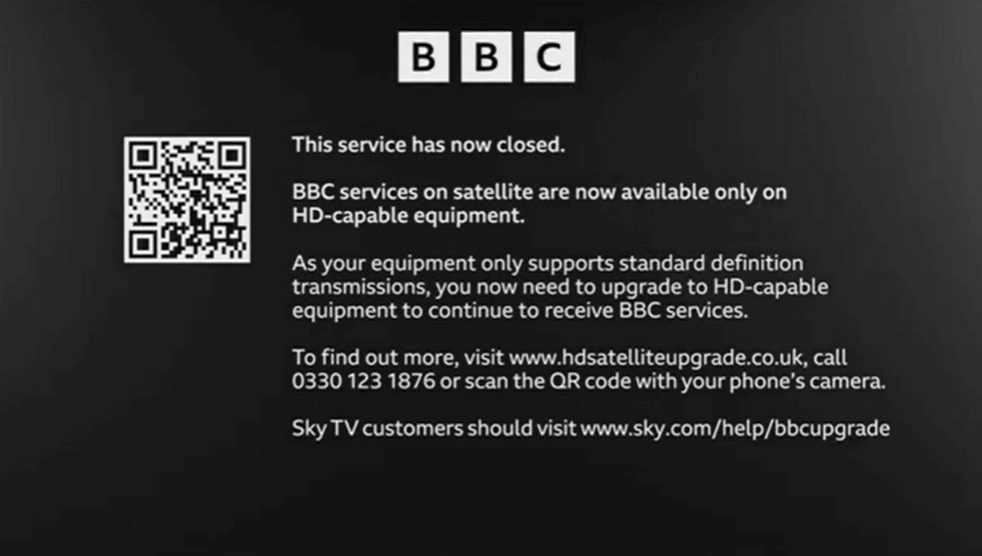The last remnants of the BBC’s standard definition TV services will vanish from satellite next week in a low-key end of a project to upgrade viewers to HD. The project provides a template on how forthcoming BBC cuts are managed.
- BBC to complete final stage of its HD satellite upgrade project
- SD channel switch-off largely unnoticed by satellite viewers
- BBC will hope it can pull off a similar trick in the future when it winds down other legacy services.
On 26th March, the last remaining subset of Sky satellite receivers to still list the legacy BBC standard definition (SD) services will see them removed from the channel list for good. The BBC stopped broadcasting programmes on the channels in January, replacing them with a static on-screen message.
The low-key event comes just over a year after the BBC made all of its channels available in HD for the first time. It will enable the BBC to clear one satellite transponder.
The BBC often faces a flood of complaints when it announces plans to cut or close services. On occasion, it’s had to perform a high profile U-turn. Notably, at the beginning of 2020, it announced a reprieve of the BBC Red Button Text service. Two years later, it brought back BBC Three as a regular broadcast channel.
How did the BBC manage to pull of SD closure without many viewers even noticing?
By the time the BBC confirmed it would be turning off standard definition services, most homes had already upgraded to an HD compatible receiver. In December, ITV estimated that over 98% of satellite homes had HD equipment. Despite this, it hasn’t yet followed the BBC in turning off all of its SD channels.
As a result, hardly anyone noticed or cared when the SD channels closed. Most viewers had already been automatically migrated from SD to HD. Some series links and scheduled recordings needed to be reset. Generally though, the changes occurred without much fuss.
The BBC will hope to cut other services using the same playbook in the coming years.
For example:
BBC Red Button Text
BBC Red Button Text, once part of a service called BBCi, was introduced to replace Ceefax as viewers switched from analogue to digital TV. Despite a reprieve at the beginning of 2020, it doesn’t have a future.
The text service is no longer supported on newer devices. Every time a viewer upgrades to a new device, they lose access to the service.

The end result: ever fewer viewers are using – or able to use – Red Button Text. And when the BBC finally does turn off the service, like the end of SD TV on satellite, very few viewers will even notice or care.
Satellite TV
The BBC has already set out its goal to move to online-only broadcasting in the years to come. That means distributing its linear TV channels through internet-based TV platforms only.
Each time a Sky viewer signs up to upgrade to Sky Glass or Sky Stream, that’s one less viewer reliant on the satellite TV signal.
But the BBC is working on ensuring non-Sky viewers are moved away from satellite in the coming years.
The launch of Freely, the UK’s next generation TV platform for free-to-air broadcasters is due to take place soon. It will replace Freeview and Freesat (though not overnight).
For Freely devices that include a satellite tuner, the receiver will be able to access multiple versions of BBC channels – the versions broadcast via satellite and versions streamed online. The BBC, along with other broadcasters will be able to specify which version of the channel will display as the default. This means the BBC can force the receiver to default to the online versions and ignore the versions received by satellite. That will result in a steady increase in homes no longer dependent on satellite.
At the same time, there’s a whole new generation of adult viewers. They may have watched satellite TV when they were younger. Now in their own homes, they haven’t bothered having traditional TV services installed and are already broadband-only TV users.
Consequently, there will come a tipping point when sufficient viewers have migrated and it is no longer viable to retain satellite TV. That point may be forced on broadcasters when the current fleet of satellites reach end-of-life.
The BBC will hope that like the recent SD-switch off, when the time comes, most viewers won’t even notice when the service is closed.
Marc Thornham
[Image: BBC SD switch-off message, 8th January 2024. The advertised help scheme was closed in February 2024]

